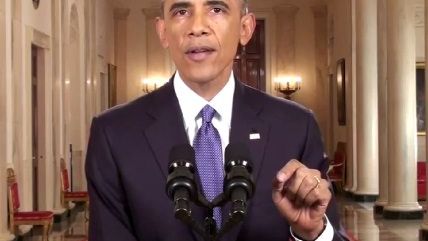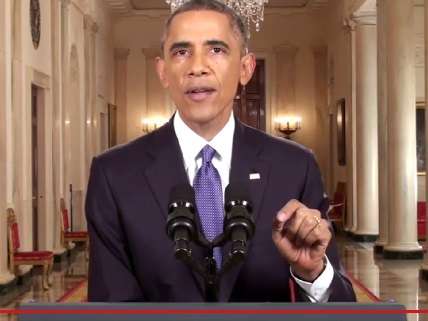Tyrant or Liberator? The Pundits React to Obama's Immigration Plan


President Obama's announcement last night of new executive action that would legalize an estimated 4-5 million illegal immigrants has enraged the conservative commentariat as much as it has placated the liberal punditocracy. Libertarians, meanwhile, had a wider range of reactions: Many are pleased with the actual policy but concerned that it came about through even more executive overreach.
Making the libertarian case that Obama's decision falls well within established legal precedent, here is Ilya Somin (a George Mason University law professor, Cato Institute scholar, and Volokh Conspiracy blogger):
Article II of the Constitution states that the president must "take Care that the Laws be faithfully executed." But that does not mean that the president has an absolute duty to prosecute all violations of federal law, or that he cannot choose which ones to pursue based on policy considerations. If it did, virtually every president in the last century or more would be in violation. …
To the extent that large-scale use of prosecutorial discretion is ever appropriate, it is surely so in the case of helping people whose only violation of the law is fleeing poverty and oppression under terrible Third World governments. Few other offenders have such a compelling moral justification for breaking the law. I strongly support the legalization of marijuana and the abolition of the War on Drugs more generally. But illegal immigrants violating the law to escape Third World conditions are considerably more deserving of our compassion than college students violating it to experiment with marijuana or other illegal drugs. If exemption from prosecution is acceptable for the latter, it should be permitted for the former too.
Somin argues that all presidents must set uneven enforcement priorities—it's simply impossible to do other wise. The president's decision to focus on certain categories of lawbreakers instead of others can hardly be deemed illegal. Plenty of laws considered silly by the authorities go unenforced. That may be a problem in and of itself—and it's made worse by the sheer volume of federal laws—but now is a strange time for libertarians to make that argument, given that the outcome of not enforcing restrictive immigration laws is liberty-maximizing.
Eric Posner, a professor of law at the University of Chicago, wrote that immigration enforcement is unlike other aspects of the law and is uniquely the purview of the executive branch:
Thus, the president's discretion to enforce the immigration laws has always been the cornerstone of a de facto guest-worker (or, if you want, caste) system from which most Americans have greatly benefited. That's why Republicans' claim that the president is shredding the Constitution sounds so odd to people knowledgeable about immigration law. He's just doing what countless Congresses have wanted him to do, and have effectively forced him to do, so that Congress itself could avoid charges that it has created a two-tier system of citizenship where the bottom tier is allowed to stay in this country and work, but is not allowed to vote, to benefit from welfare programs, to travel freely, or to enjoy the full protection of workplace laws. Of course, you might say that the whole illegal immigration system, with its two-tier system of rights, violates the Constitution or at least constitutional values, but the fault for that lies with Congress, not with the president.
On the right, conservatives accused the president of unilateral tyranny. National Review's Rich Lowry set the tone:
Altogether it would have been a wholly adequate pitch for Congress to pass comprehensive immigration reform, in the normal give-and-take over proposed legislation. But he's out of that business. Now he proposes and disposes, and the only alternative is assent.
This charge was echoed and amplified by a host of Republican politicians. Sen. Ted Cruz called Obama "a monarch." Rep. Michele Bachmann called him "a dictator." Speaker John Boehner's office referred to him as "Emperor Obama."
Even Sen. Rand Paul, a libertarian-leaner seen as more sympathetic to immigration reform than many other Republicans, accused the president of "lawlessness" and attempting to issue "executive amnesty." He wrote on Facebook:
President Obama is not above the law and has no right to issue Executive Amnesty. His actions blatantly ignore the Separations of Powers and the principles our country was founded on. The President has said 22 times previously that he does not have the power to legislate on immigration.
I believe that immigration reform is needed, however for true and effective reform, we must first secure the border. I will not sit idly by and let the President bypass Congress and our Constitution.
The Washington Post's Jennifer Rubin criticized the notion that other presidents have taken similar paths on immigration reform:
His assertion that other presidents have done the same is patently false, something the former constitutional law instructor should know. No, in other cases the presidents acted to interpret existing law as Congress authorized them to do. And the huge number of the persons affected by Obama's actions in and of itself sets a new and disturbing precedent. In short, prior presidents were not operating in direct contravention of law that Congress refused to change.
Just about the only hint of praise on the right came from the editors of the conservative New York Sun in a terrific editorial extolling the virtues of sane immigration policies:
President Obama's immigration speech last night could yet go down as his finest hour. No doubt there are those who will retort that this isn't saying a whole lot, given the disappointments of his presidency. But we are among those on the right who reckon that if we want — as we do — the free movement of trade and capital we also need the free movement of labor. Nor does the free movement of people burden our economy. The virtue of our system of democratic capitalism is that incents individuals to produce more than they consume, so that the more is the merrier.
Moving leftward, Andrew Sullivan expressed similar sentiments:
The paradox of living somewhere and building a life and knowing that it can all be suddenly swept away; the thought of being separated from those you love – for ever; the stresses within families and marriages that such a shadowy existence can create. We need a full-throated defense of immigration in these cramped and narrow times, and the president was more than eloquent on that tonight – and made his case with a calm assurance and intensity. I'm gladdened by it – and I can only begin to appreciate how his words will have felt to millions of others.
The Atlantic's Peter Beinart wrote that the president's announcement was all about living up to his progressive activist roots:
For progressives, this was always the real promise of Barack Obama. It was the promise that a black man with a Muslim name who had worked in Chicago's ghettos—a man who had tasted what it means to a stranger in America—would bring that memory with him when he entered the White House. It's a promise he fulfilled on Thursday night.
Former White House Press Secretary Jay Carney was willing to admit that the president had flip-flopped on the legality of such action, at the very least:
"Well, here's what I say," said Carney. "I think if he could have those words back, especially the first clip where he specifically talked about suspending deportations--that is literally what he is doing today. In later instances including when I was there he would speak carefully about what he could not do as president. He can't change the law. He can't provide a path to citizenship."
Important questions remain about what the actual impact of this policy will be. Does Obama's sucessor now have the express power to roll back this exact enforcement decision? If he does, many immigrants might wisely decide to pass on Obama's call to become legal citizens. Better than that register with the government and face deportation two years from now under a President Cruz or Perry.
At Reason, we love immigration but hate executive overreach, so things like this will always be something of a mixed bag. Peter Suderman thought the plan was "legal but unprecedented." Matt Welch was critical of Obama's definition of the word amnesty and wrote: "People really resent line-jumpers when the queue stretches back as far as the eye can see; speed up that process and our national debate would look a lot more reasoned and thoughtful."
Since I despise the enforcement of expansive, confusing, and cruel laws, I personally count this as one of the president's more gratifying decisions.
What say you?
[Edit: Links added for Sullivan and Beinart pieces.]


Show Comments (175)